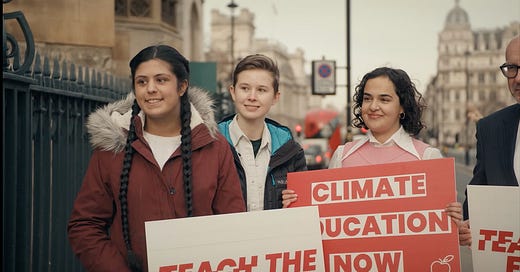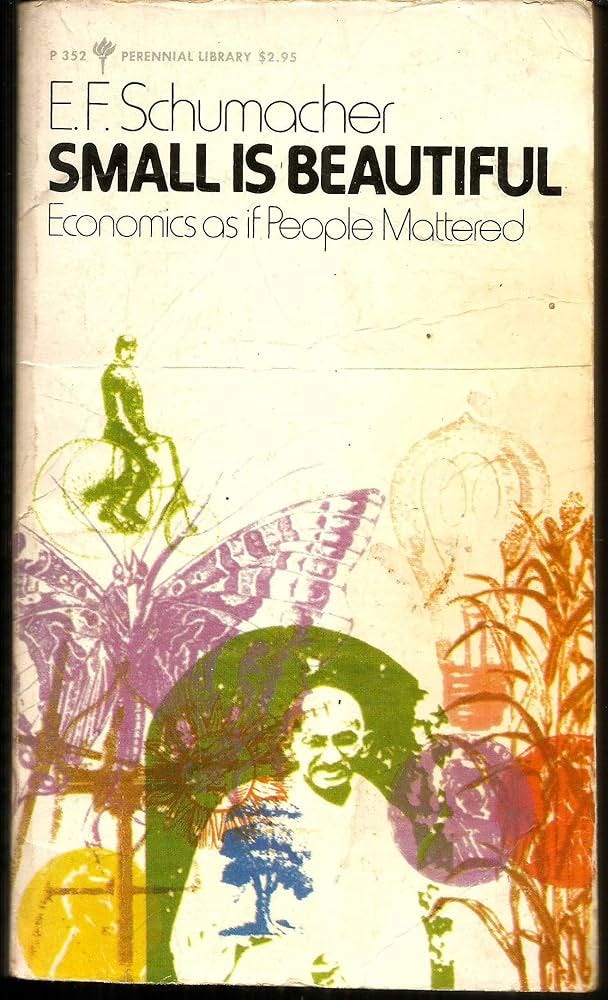The last three evenings—Sunday, Monday, and Tuesday—I co-hosted a screening and discussion of The Week, described as a “climate change group experience.” The creators intentionally designed it to follow a U-shaped emotional arc, meaning the first night is the tough love truth about how bad the climate is now and how bad it could get, the second night answers the questions—how did we get here? and why are we so stuck?—and the third night helps us see what the heck we can do about it. As someone who has been trying to learn more about climate change and take action where and how I can, it felt like a rigorous, but loving way in.
I’m not going to lie—after the first night’s film and discussion I woke up at 3:30am and lay in bed for an hour, my 7-year-olds feet smashed against my thighs as she snoozed away. I worried for her future. One of the premises of the first film is asking viewers to think about 2050 and how old they will be and how old a young person they love will be. (In my case, I’ll be 70 and my daughters will be 34 and 31.) Then they painted a picture of how warm, desperate, and violent things could get by 2050 if we don’t start taking large scale, collective action to reverse climate change.
It dawned on me that while I spend a lot of time trying to either prevent my daughters’ suffering or help them weather an inevitable and healthy amount of discomfort, my efforts are mostly in the present moment. I’m thinking—what will Maya actually eat for lunch that has protein in it? Not—will Maya be able to procreate if she wants to given that sperm count is down globally and predicted to continue to plummet?
I know this is normal, not a personal failing on my part; we are wired for fairly short-term thinking, particularly when we are busy and under-resourced. (sometimes called “cognitive tunneling”). But just because it is normal doesn’t make it okay. Watching these films and having these discussions helped me pick my gaze up and look way further down the line of my daughters’ lives (and mine). I want to hold on to that feeling because it is terrifically motivating…especially paired with episodes two and three, which were focused on painting the systemic and cultural picture and what we can do now for a better future.
The creators argued that the reason we are so stuck is not a result of a lack of viable solutions. It is due to “deep stories” we have that get in our way of change. The first is the “story of more”—that very Western delusion that the more we have of a good thing—clothes, food, gadgets—the happier we will be. This leads to a production and consumption pace that is destroying our planet and leaving people lonelier and lonelier. I wrote about this in my book, The New Better Off, which had an unfortunate publication date—right before Trump was elected. Many of us were suddenly not asking, what is the good life? but instead, will life continue, period, under this man’s leadership?). Here’s my TED talk on the conversation I was hoping to have:
I had very little climate consciousness at the time, so I didn’t weave the new (/old…much of what I call for is a return to the wisdom of “small is beautiful” thinking) deep story I was trying to tell in with themes of planet and environmental peril, but I now see that I so easily could have.
The other “deep story” they spoke about was a disbelief many of us have in the notion that mass change—systemic, cultural, all the kinds—can happen quickly. On the one hand, we’re right; massive transformation takes generations. BUT, there are moments when we take what feel like wild leaps forward (think of the late 60s and all the civil rights and feminist victories of the time). These moments often take the good, daily work of movements and leverage the shit out of them because of some unpredictable turn of events. This could happen on climate if we want it to. The “we” just has to be big enough and ready for the right moment.
And even on that front, there is promising news. Political scientist Erica Chenoweth’s argues for what they call the “3.5% rule”—the notion that no government has been able to withstand a challenge of over 3.5% of its population without accommodating the movement or (in extreme cases) disintegrating. In addition to explaining why mass nonviolent resistance has been so effective, they also share some lessons learned about why it sometimes fails.
What would it take to reverse climate change? For starters, it would take many, many more of us—particularly in the Western world where we are currently consuming the majority of the planet’s resources—to ask different questions of ourselves, most importantly: what is mine to do?
The final film in the series is filled with examples of people who asked this question of themselves and found different answers. Some of them agitate for change within their workplaces. The story of Interface Carpet is particularly moving if you’ve never heard it. Some of them have become activists—one doctor created an advocacy organization designed to make sure that every medical professional in California understands the intersection between climate change and health outcomes, particularly for the most marginalized. Every year 350,000 people’s lives are cut short because of pollution. Some of them are agitating for policy, like the young people in England who got a bill introduced that would ensure every kid in their country gets educated on climate change.
They emphasized that taking action can be daunting if we do it with an expectation of purity. I felt my own mind going there pretty quickly, making goals I probably couldn’t honor to myself—I’ll buy no new things in 2024, become vegetarian, and stop using single-use anything. That’s probably not realistic for me. But I probably could attempt to buy as few new things as possible, only cook vegetarian at home, and make an effort to bring my coffee mug with me more consistently when I’m out and about. That wouldn’t save the planet, but it will help me move further along on my own journey of being a better steward of the resources we have left.
I wish the films had more boldly emphasized just how unevenly distributed the suffering already being caused by climate change is. The rising temperatures and lack of infrastructure to weather them are already killing people, making them sick, displacing them, and causing them to lose land they love in so many parts of the world. For them, 2050 is already here. Their kids are already standing on shaky, dry ground. Some of the parents in the room and I discussed how much we should talk to our small children about how bad things could get, which in and of itself, is a massive privilege. So many parents around the world don’t have a choice because they are living with the damage alongside their kids already in such a visceral way. I have learned so much about the deeply unequal ways we are impacted by climate change from Colette Pichon Battle, among others.
I’m grateful for this imperfect and no doubt incomplete entry point into the conversation with a community of people. It was especially moving for me to sit at a table with people in their mid-80s on each of these nights and hear how they were seeing the climate crisis, what it reminded them of in their own past, what they were hoping to do with their time left to be a part of change. On the last night we were supposed to discuss the question—imagine it is ten years from now and you have taken action. What have you accomplished?
The three elders at my table matter of factly said, “I don’t think I’ll be here in ten years…” and then went on to talk about what is inspiring them in this moment (creek restoration, indigenous-led land back movements, the small, hard work of talking to adult children and grandchildren about climate change).
And this, in the end, is the real lesson—to not give up, no matter what age we are, no matter how overwhelmed or fearful. To gather with others and slow down long enough to not just learn, but feel—feel the weight of our grief that the planet has been forever altered by our actions, particularly if we are of the Western world, and that we owe our children and grandchildren something healthier and more whole. I’m planning on taking action in various ways, but also just sitting in that feeling and not rushing on to solutions. It’s not guilt, exactly, but gravity—deep and full of love and grief.
I would love to hear, what feelings are you having about the climate right now? How are you figuring out what is yours to do? Have you watched or read something that helped you further along on your journey? (Remember we have crowdsourced this wonderful list.)






Courtney, your work is consistently helpful, urgent, thoughtful & actionable. Thank you for continuing to keep a steady hand on our backs as we try to walk forward in an impossible world.
As for me, the part I feel called to play is coming to light on the heels of a hellish year of treatment for breast cancer. I’m cancer free now, but the whole year all I wanted to read was powerful nature writing. My usual blend of memoir-and-novel on the nightstand got shoved aside for every good book I could devour on the wonder and precarity of the natural world. At first I couldn’t understand this urge—was it escapist to read about trees and birds? Was it doomsday to read about melting glaciers and rising seas? But then I came to see how I was understanding myself anew as a creature in creation: vulnerable to the same forces as the earth itself.
Coming out of cancer, I’m finding that the book I was writing before my diagnosis has changed so tremendously that I have to set it aside for now. A new story is churning within me to be told, and it’s exactly this: how urgent it is for each of us to discover, within our own bodies, what it means to be part of the planet. Thank you for the ways you continue to inform and encourage my own work from afar.
Thank you for sharing all of this. I feel so much heaviness and personal responsibility when I think about climate change, but I also know that it's the corporations hurting our climate the most right now, and the fact that our government/society does not hold them accountable. The narrative seems to shift a lot of personal blame onto citizens. Yes, I take small actions in my life to try to positively impact my personal sphere of influence (raising a child that holds deep reverence for our earth is a big theme for me right now!) but the actions I take often feel small and insignificant. It's such a helpless, frustrating feeling at times. Holding space for the rage/grief cycle around this.